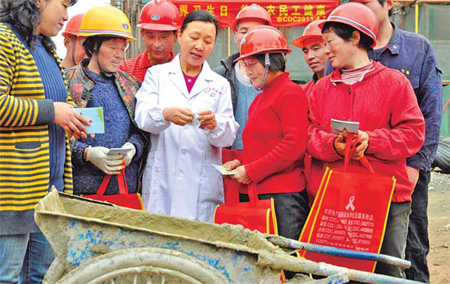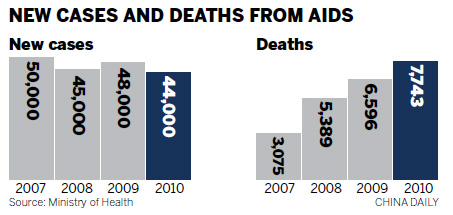Society
AIDS deaths hit 'peak' as 7,700 die
By Shan Juan (China Daily)
Updated: 2011-04-20 07:27
 |
Large Medium Small |
BEIJING - AIDS deaths are believed to be peaking on the Chinese mainland as many from the large number of people infected with HIV in the 1990s because of unsanitary blood-selling schemes develop full-blown AIDS, a senior health official said on Tuesday.
 |
|
A doctor from the Center for Disease Control and Prevention in Fuyang city, Anhui province, talks to workers at a construction site about avoiding AIDS/HIV earlier this month.?[Photo/ China Daily] |
Hao Yang, deputy director of the disease prevention and control bureau at the Ministry of Health, made the remarks at the launch of the Tsinghua-Janssen Public Health Day on Tuesday.
By the end of last year, the total reported number of AIDS deaths had reached 68,000, according to statistics from the ministry.
Since 2008, AIDS has become the country's top infectious killer and it claimed the lives of 7,700 people in 2010 alone.
"As those infected in the 1990s have developed full-blown AIDS, the number of deaths has surged," Hao noted, adding that poor drug compliance largely because of side effects added to the number of deaths.
| ||||
The official number is unavailable.
Back then, agencies dubbed "blood heads" attracted poor farmers to become blood plasma donors by offering deals many thought were tempting.

The agencies drew patients' blood, extracted the plasma and infused the rest back into the donor, who was also paid. Many donors contracted HIV because of contaminated transfusion equipment.
In 2004, official statistics said Henan had more than 30,000 people who were infected because of the tainted plasma-selling schemes.
Zhang Beichuan, one of the country's leading AIDS/HIV scholars, said: "That figure was definitely underreported."
To address the problems, the government cracked down on the illegal plasma-selling schemes, enhanced safety supervision and management of blood collection, and offered free medication to all patients.
Currently, China has about 740,000 people living with AIDS/HIV, including 140,000 full-blown AIDS patients, official statistics show.
Hao urged people with the virus to accept the free medication they are entitled to and the first-line antiretroviral regimen, and said the government is making efforts to also provide free second-line drugs to those in need.
The first-line antiretroviral regimen has helped reduce the fatality rate of full-blown AIDS patients on medication from 10.8 percent in 2005 to 4.6 percent last year.
Among the 100,000 patients now on medication, 20 percent have developed resistance and need second-line treatment to survive, he said.
"Good drug compliance worked well to delay the resistance," Zhang noted.
He also urged people engaging in high-risk behavior to take free screening for HIV at designated medical institutions because early detection is important in delaying the onset of the disease.
Despite regulations that prohibit homosexuals and carriers of sexually transmitted diseases, including AIDS, from donating blood, some gay people with HIV are believed to have donated blood and refused to declare their sexual orientation in order to avoid discrimination, Zhang said.
"That has caused sporadic cases of HIV infection among blood users," Hao disclosed, adding that widely used testing methods cannot detect HIV in the blood of people who have recently become infected.
In the past few years, men who have sex with men (MSM) have become one of the most vulnerable groups for contracting AIDS/HIV, experts said.
Among the 44,000 new HIV infections detected in 2010, nearly 13 percent were infected through gay sex, according to the Ministry of Health.
"AIDS/HIV became rampant among the MSM population which has an average HIV prevalence of 5 percent nationwide," Hao said. He noted that the infection rate is 0.05 percent among the general population.


